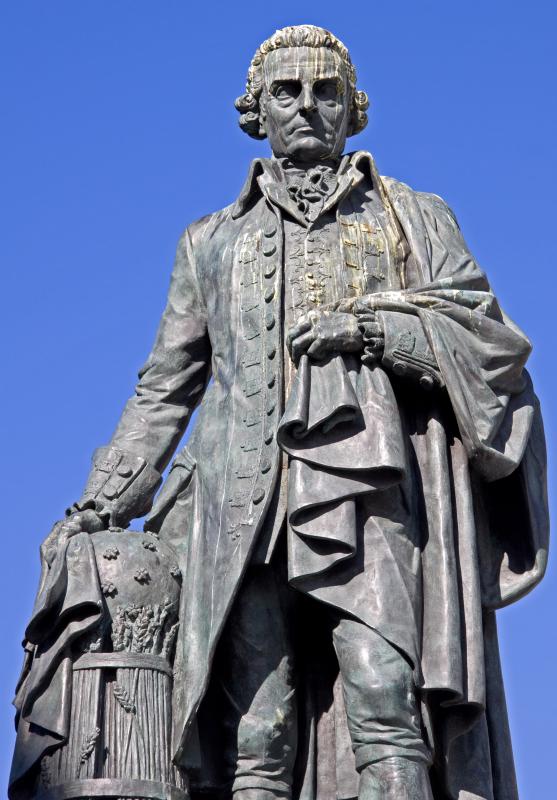At WiseGEEK, we're committed to delivering accurate, trustworthy information. Our expert-authored content is rigorously fact-checked and sourced from credible authorities. Discover how we uphold the highest standards in providing you with reliable knowledge.
What is Mercantilism?
Mercantilism is a mostly historical economic theory that holds the wealth of a nation can be measured by its ready supply of capital, generally held in a concrete form like gold or silver. Mercantilism states that the global supply of wealth is a fixed amount, and that therefore any gain of wealth by one nation must necessarily represent a loss by another. Mercantilism is therefore in many ways the opposite of the later laissez-faire capitalism promoted by economists such as Adam Smith.
The theoretically ideal form of mercantilism was represented by a nation that purchased nothing from outside countries, instead only exporting finished products in exchange for capital and steadily building up its own wealth. This would be accomplished by providing for all of its citizens’ needs domestically, and by extracting raw resources from the country itself or from colonies, and then finishing them within the country before exporting them. In practice, this ideal could never actually exist, and so mercantilism was concerned with trying to get as close to the ideal as was possible.

In truth, there was no real cohesive theory of mercantilism during the era its ideals were ascendant, from the 16th to 19th centuries. Different economic philosophers and government officials focused on different aspects of what is now called mercantilism, but it wasn’t until a strong opposition began to form, by free-market economists like Adam Smith, that the term was used to describe the disparate collection of goals. In retrospect, however, it is easy to see how the different threads of thought all worked towards a similar ideal, and therefore did seem to form a loose-knit mercantilism.
One of the main principles of mercantilism was that global economics was a zero-sum game: if one nation gained, another lost. This meant that it was crucial to minimize the exporting of capital, and to maximize the importing of capital. So nations would eliminate taxes and barriers of trade within their own countries, and raise massive barriers to all exports. It also became imperative to try to extract every ounce of raw resource domestically, and to transform that raw resource into finished products that could be exported at a hefty profit. If raw materials weren’t immediately available, it was acceptable to import them, then finish them in country, and export them at a profit.
Colonies also played an import role in mercantilism, as a steady source of raw resources and a captive market. Resources could be extracted from subjugated colonies, shipped to the mother country, worked into finished products, then sold back to the colony market, which often would have laws in place to give favorable trade treatment to the mother country over all other nations wanting to trade. The exporting of capital markers, such as gold and silver, was particularly limited under mercantilism, as it was seen as a measure of a nation’s direct wealth.
Ultimately, the theories of mercantilism fell into disfavor as the free market ideology became ascendant. In the free market theory the free and ready trade of goods was seen as beneficial to all parties involved, with the global economy seen as an almost unlimited resource, rather than as the closed zero-sum game mercantilism promoted. Although some pockets of mercantilist thought held out until the early 20th century, by the mid 20th century it was virtually abandoned by all serious economists.
AS FEATURED ON:
AS FEATURED ON:











Discussion Comments
Since the value of money is no longer backed by silver or gold but rather by the guarantee based on the full faith and credit of the issuing country, mercantilism could not work today.
In fact, a strong argument could be made that this economic theory was never really viable.
Mercantilism could rape a country of precious natural resources.
It could also be argued that this way of thinking helped trigger the American Revolution.
England wanted to use the vast, new found resources in the American colonies, while the colonists wanted to use them to develop their new world.
As a result, England imposed serious taxes on the colonists, the most well known on tea coming into the country, and the colonies decided to try to gain their independence.
Had the king compromised with the early Americans and found a way to share the resources he felt belonged solely to the mother country, England may not have been cut off completely from the colonies.
Post your comments